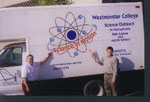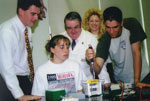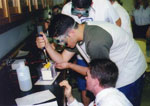Posted on Monday, October 1, 2001
Nearly 1,300 area junior and senior high students have been able to work with state-of-the-art laboratory equipment and experiments thanks to Westminster College's "Science in Motion" program.
Westminster College is one of nine centers in Pennsylvania that offers "Science in Motion" to area junior and senior high schools, and focuses on schools in Butler, Lawrence and Mercer Counties.
The program, designed and founded by Dr. Donald Mitchell, a 1960 Westminster College graduate, provides middle and high school students with laboratory experiences that includes state-of-the-art equipment, and offers teachers professional development opportunities through workshops and mentoring links with college faculty. Mitchell's model is currently used at each of the centers in Pennsylvania.
"Give teachers the proper support, and they can do fantastic things," said Mitchell, currently a professor at Juniata College.
"No matter the size, tax base, or location of the school, students in a Science in Motion class have equal access to technologically cutting-edge equipment," said Dr. Timothy T. Wooster, director of Science in Motion at Westminster College. "Few teachers in our state have the resources to run an effective laboratory program, but this program gives them that equipment."
"Most science teachers are assigned to teach multiple subjects during the day, and there is little time for them to prepare for lab experiments," continued Wooster. "But our Mobile Educator Bernard Durkin, can teach the entire laboratory during his visit without any additional preparation time for the classroom teacher."
"Initially we sent out an invitation to every superintendent in Lawrence and Mercer counties, as well as a select few in Butler county," said Dr. Kathy Shaffer, curriculum and workshop coordinator of the program at Westminster College. "About 60 superintendents and teachers attended the first meeting, and from them we found out what their needs were. Now it's pretty much word of mouth that spreads our message."
So far, the Westminster College Science in Motion project has reached 28 teachers from 15 different schools who attended a one-day workshop in February, and 19 teachers from 17 schools who attended the weeklong summer workshop. More than 500 students have received visits from Durkin, who taught 16 chemistry and 13 biology classes. Equipment loans have been made 61 times impacting the classes of 1271 students.
"I try to team teach with the local teachers," said Durkin, a retired Ambridge chemistry and physics teacher. "I love this job because I don't have to correct papers, but I still get to work on the fun stuff with the students."
In addition to setting up labs for local schools and loaning them equipment for experiments, teacher workshops are a large part of this program.
"Teachers should know that they can receive six professional development hours for each one-day workshop, and 30 credit hours for each week-long summer workshop toward Act 48 requirements at no charge to them," said Shaffer. "As a matter of fact, we pay teachers a stipend to attend the summer workshops."
"Teachers have an idea in mind, and then we develop the experiment for them," continued Shaffer. "For example we have an experiment on phosphate analysis and this year's favorite, Micro-Density of Plastics."
Several Westminster College students are also involved in the teacher workshops including: Vincent Caruso, a junior chemistry major from Butler; Logan Edmiston, a sophomore biology major from New Wilmington; Katie Krone, a junior chemistry major from Sebastopol, Calif.; and Justin Shearer, a senior chemistry major from Connellsville.
"They prep and test experiments before it goes out, and then show how the equipment works and help wherever they are needed," said Wooster.
Teachers who have attended the workshops have high praise for the program.
"I've learned a lot; one of the best weeks I've spent in a long time for learning new things," wrote one teacher in her evaluation of the summer workshop.
"The workshop was a great kick off for this program. Hopefully more teachers from each district will choose to attend next time. The binders were excellent, food was good, and the people in charge were friendly and extremely helpful - they went out of their way to accommodate us!" wrote another area educator.
"In addition to providing students and teachers with state-of-the-art scientific equipment, we want to facilitate the implementation of the Pennsylvania Science Standards, and increase student interest in science and science careers for both men and women," said Wooster.
The Pennsylvania Department of State funds this project through the Higher Education Basic Education Science and Technology Partnership.
"Westminster received $200,000 from the $2.4 million of the entire budget to fund this project," said Wooster. "The state only has three mandates: to meet the needs of our local teachers; help the teachers meet the proposed Pennsylvania science standards; and to build the an assessment component that is uniform to all sites in the state."
Westminster's schedule for one-day workshops includes: Oct. 6 "Biology & Chemistry: Working with LabPro Equipment;" Feb. 2, a choice of either "Biology: Electrophoresis-DNA and Protein" or "Chemistry: Chromatography-HPLC and GC"; April 6, a choice of "Biology: Environmental Testing" or "Chemistry & Physics: Spectroscopy and Nuclear Chemistry."
Summer workshops include: June 10-14 "Introductory Workshop" and June 24-28 "Advanced Workshop" which requires completion of the Introductory Workshop.
"Our October 6 workshop is not completely filled," said Shaffer. "Each workshop has a different topic. Teachers can attend as many workshops as they like and it's all free!"
For more information, contact Durkin at (724) 946-6294 or e-mail durkin@westminster.edu or visit the website http://www.westminster.edu/sim/.


